六年级上册英语Unit5第五单元知识梳理
人教PEP六年级英语上册 Unit5_知识详解

Unit5 知识详解A Let’s talk 知识详解重难点1. 询问他人的职业的句型——What does ... do?课文应用:What does he do? 他是做什么的?He’s a businessman. 他是一位商人。
句型结构:问句:What does + 主语(第三人称单数) + do?答语:主语(第三人称单数) + is a/an + 职业名称(farmer, teacher, doctor...).重点解析:此问句用于询问他人的职业,属于wh问句(do型)。
基本程架:疑问词+ 助动词+ 人/物+ 动词原形?What does he do?what: 意为“什么”。
在此处用来询问他人做什么工作。
does: 助动词,因主语是第三人称单单数,所以助动词用does.do: 意为“做”。
要注意与前面的助动词does区分开。
生活实例:Maomao在询问Ann的家庭情况,Maomao想知道Ann的爸爸是做什么的:Maomao: What does your father do? 你爸爸是做什么的?Ann: He is a doctor. 他是一位医生。
知识拓展:询问他人职业的其他句型询问他人的职业还有一个句型:What + be动词+ 某人?例如:What is the tall girl? 这个高个子的女孩儿是做什么的?要点提示:用“What + be动词+ 某人?”来询问职业时,一般不用于第二人称。
如果你当面问对方“What are you?”会显得很不礼貌,针对第二人称可以用“What do you do?”来询问。
知识链接:常见的职业名称detective侦探nurse护士pianist钢琴家journalist新闻记者editor编辑civil servant公务员fisherman渔民sailor水手fireman消防员artisan工匠;手艺人dentist牙医tailor裁缝A Let’s talk知识详解拓展点1. 常见的构成职业名词的后缀在英语中,有些名词由词根加后缀构成,常见的构成职业名词的后缀如下:A Listen, match and say. 知识详解拓展点1. 合成名词夏令营课文中出现的postman和businesswoman都是合成名词,现在让我们一起总结一下合成名词吧!foot(脚) + ball(球) = football(足球)head(头) + ache(疼痛) = headache(头疼)basket(篮子) + ball (球) = basketball(篮球)tooth(牙) + ache(疼痛) = toothache(牙疼)news(新闻) + paper(纸) = newspaper(报纸)class(班级) + room(房间) = classroom(教室)house(房子) + work(工作) = housework(家务)school(学校) + bag(包) = schoolbag(书包)water(水) + melon(瓜) = watermelon(西瓜)note(笔记) + book(书) = notebook(笔记本)book(书) + store(商店) = bookstore(书店)bed(床) + room(房间) = bedroom(卧室)black(黑色的) + board(木板) = blackboard(黑板)play(玩) + ground(地面) = playground(操场)B Let’s talk知识详解重难点1. 询问他人的工作地点的句型——Where does ... work?课文应用:Where does he work? 他在哪儿工作?He works at sea. 他在海上工作。
牛津上海版六年级英语上册Unit 5知识点归纳

牛津上海版六年级英语上册Unit 5知识点归纳一.课前回顾far away from 远离go shopping 去购物a good idea 一个好主意at weekends 在周末come back (=go back) 回来Have a barbecue 去烧烤Plan to do sth 计划去做某事Speng …on sth 花费时间做某事Spend … in doing sth 花费时间做某事make sandcastles / a sandcastle 做沙雕on (island) 在岛上fly kites 放风筝Let sb (not) do sth 让某人做某事Have a good time=enjoy one self 玩得高兴Something special 特别的东西二.单词理解1.Programme n. 活动安排n.计划;节目;课程;(演出或活动的)程序vt.计划;训练;培养;预调vi.编程序;制作节目词性转换:n. programming 设计,规划;编制程序,[计] 程序编制programmer 程序员,[计][自] 程序设计员词语辨析: programme, project, scheme, plan,design,例句:The broadcaster bit off the music programme.广播电台中断音乐节目。
The programme would abend after the third line.程序在第三行以后会异常终止。
That was a health programme to benefit everyone.那是一项对人人都有好处的健康计划。
Yesterday's programme was rather dul2.arrive v. 到达;成功;达成;出生短语:arrive at 达到,达成;到达某地arrive in 抵达,到达arrive from 从某地来(这里)arrive on 到达arrive home 到家arrive at a conclusion 得出一个结论arrive at a decision 决定下来to arrive late 迟到词性转换n.arrival 到来;到达;到达者arriver 到达者词语辨析: arrive, attain, reach, achievearrive at后接小地方arrive in后接大地方e.g.I arrive at school at7:15.He will arrive in Shanghai at two o’clock.例句:We must clear the room before our guests arrive.我们必须在客人到达之前把房间收拾好。
Pep 人教版六年级英语上册第五单元Unit 5 What does he do 知识总结
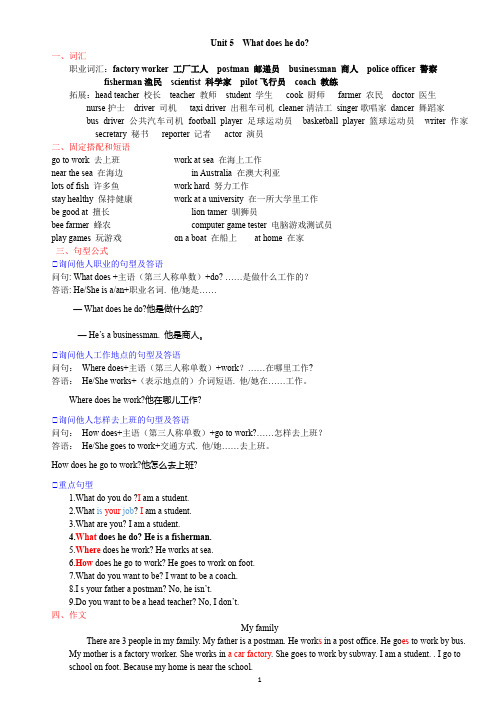
Unit 5 What does he do?一、词汇职业词汇:factory worker 工厂工人postman 邮递员businessman 商人police officer 警察fisherman渔民scientist 科学家pilot飞行员coach 教练拓展:head teacher 校长teacher 教师student 学生cook 厨师farmer 农民doctor 医生nurse护士driver 司机taxi driver 出租车司机cleaner清洁工singer歌唱家dancer 舞蹈家bus driver公共汽车司机football player足球运动员basketball player篮球运动员writer 作家secretary 秘书reporter 记者actor 演员二、固定搭配和短语go to work 去上班work at sea 在海上工作near the sea 在海边in Australia 在澳大利亚lots of fish 许多鱼work hard 努力工作stay healthy 保持健康work at a university 在一所大学里工作be good at 擅长lion tamer 驯狮员bee farmer 蜂农computer game tester 电脑游戏测试员play games 玩游戏on a boat 在船上at home 在家三、句型公式☆询问他人职业的句型及答语问句: What does +主语(第三人称单数)+do? ……是做什么工作的?答语: He/She is a/an+职业名词. 他/她是……— What does he do?他是做什么的?— He’s a businessman. 他是商人。
☆询问他人工作地点的句型及答语问句:Where does+主语(第三人称单数)+work?……在哪里工作?答语:He/She works+(表示地点的)介词短语. 他/她在……工作。
闽教版小学英语六年级上册Unit 5 单元知识梳理

闽教版小学英语六年级上册单元知识梳理Unit 5 Housework单词:housework [ˈhaʊswɜːk] 家务those [ðəʊz] 那些dirty [ˈdɜːti] 脏的sock [sɒk] 短袜think [θɪŋk] 想washing machine 洗衣机box [bɒks] 盒子bedroom [ˈbedruːm] 卧室floor [flɔː(r)] 地板water [ˈwɔːtə(r)] 浇水plant [plɑːnt] 植物 a piece of cake 形容极其容易toilet [ˈtɔɪlət] 卫生间本单元语音学习内容为意群。
一个句子可以根据意思和语法结构分成若干个小节,我们称每一个小节为意群。
意群可以是一个词,一个词组或短语,也可以是并列句的一个分句,或复合句的主句或从句。
意群在句子中有语义、语法和语调三个特征。
在读英语句子的时候,可以根据意群停顿,在意群内进行必要的连读等。
如:Yesterday / he came home / by train.(时间状语/主语+谓语/方式状语)They told me /what I should do.(复合句的主句/复合句的从句)She is my teacher /and I am her pupil.(并列句的分句/并列句的分句)There is / a baby elephant / in the zoo. 动物园里有一只小象。
Sally / often helps her mother / do housework. 莎莉经常帮助她妈妈做家务。
She / often sings and dances / for TV programs. 她经常为电视节目唱歌跳舞。
My classmates and I / are going to play basketball / after school. 我和我的同学打算放学后去打篮球。
六上英语第五单元语法
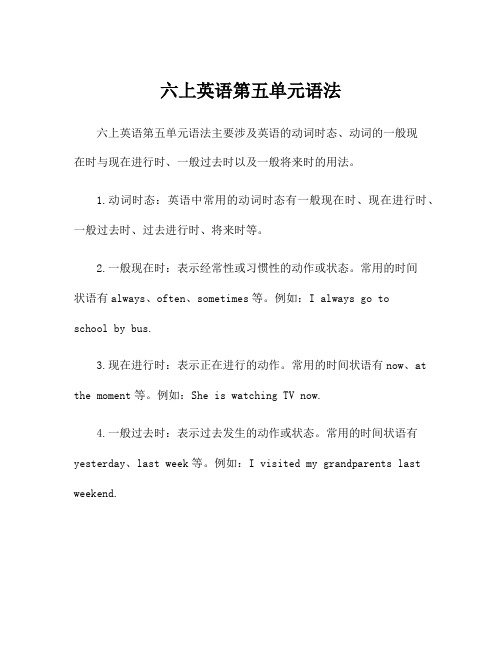
六上英语第五单元语法
六上英语第五单元语法主要涉及英语的动词时态、动词的一般现
在时与现在进行时、一般过去时以及一般将来时的用法。
1.动词时态:英语中常用的动词时态有一般现在时、现在进行时、一般过去时、过去进行时、将来时等。
2.一般现在时:表示经常性或习惯性的动作或状态。
常用的时间
状语有always、often、sometimes等。
例如:I always go to
school by bus.
3.现在进行时:表示正在进行的动作。
常用的时间状语有now、at the moment等。
例如:She is watching TV now.
4.一般过去时:表示过去发生的动作或状态。
常用的时间状语有yesterday、last week等。
例如:I visited my grandparents last weekend.
5.一般将来时:表示将来某个时间可能发生的动作或状态。
常用的时间状语有tomorrow、next week等。
例如:We will have a meeting tomorrow.
以上就是六上英语第五单元语法的主要内容,希望对你有帮助。
如有其他问题,请继续提问。
译林版六年级英语上册第五单元知识点归类整理(第一学期期末复习资料unit 5重点归纳)
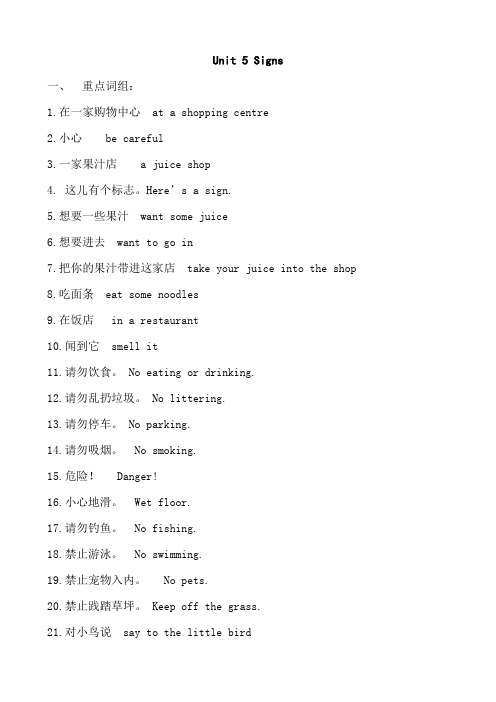
Unit 5 Signs一、重点词组:1.在一家购物中心 at a shopping centre2.小心 be careful3.一家果汁店 a juice shop4. 这儿有个标志。
Here’s a sign.5.想要一些果汁 want some juice6.想要进去 want to go in7.把你的果汁带进这家店 take your juice into the shop8.吃面条 eat some noodles9.在饭店 in a restaurant10.闻到它 smell it11.请勿饮食。
No eating or drinking.12.请勿乱扔垃圾。
No littering.13.请勿停车。
No parking.14.请勿吸烟。
No smoking.15.危险! Danger!16.小心地滑。
Wet floor.17.请勿钓鱼。
No fishing.18.禁止游泳。
No swimming.19.禁止宠物入内。
No pets.20.禁止践踏草坪。
Keep off the grass.21.对小鸟说 say to the little bird22.在英国 in the UK23.称地铁为“赛百味” call the metro “subway”24.在远足 be on an outing25.在森林里 in the forest26.是吃午饭的时间 It’s time for lunch27.感到又累又饿 feel tired and hungry28.寻找我的香蕉 look for my bananas29.带来一些作为午餐 bring some for lunch30.给了Sam一个香蕉 give Sam a banana31.发现树上有一个标志 find a sign on a tree32. 看着波比的香蕉 look at Bobby’s banana33.要一个 want one34.看见许多猴子在他们周围see a lot of monkeys around them35.继续走路 walk on36.知道一些公共标志 know some public signs二、重点句子:1.--它是什么意思? What does it mean?--它的意思是你不可以在这扔垃圾。
人教版小学六年级英语上册《第五单元》知识点
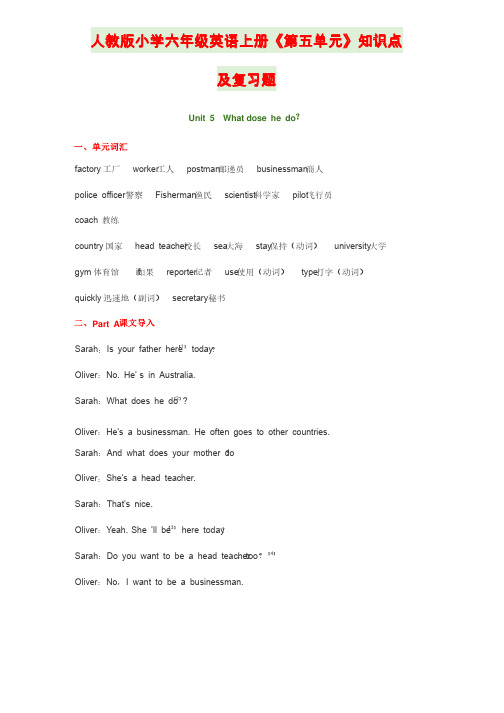
人教版小学六年级英语上册《第五单元》知识点及复习题Unit 5 What dose he do一、单元词汇factory工厂 worker工人 postman邮递员 businessman商人police officer警察 Fisherman渔民 scientist科学家飞行员科学家 pilot飞行员coach 教练country国家 head teacher校长校长 sea大海 stay保持(动词) university大学gym体育馆 if如果 reporter记者 use使用(动词) type打字(动词)quickly迅速地(副词) secretary秘书二、Part A课文导入Sarah:Is your father here【1】 today? s in Australia. Oliver:No. He’ s in Australia. Sarah:What does he do【2】? Oliver:He’s a businessman. He often goes to other countries.Sarah:And what does your mother do?Oliver:She’s a head teacher.Sarah:That’s nice.Oliver:Yeah. She ’ll be【3】 here today!Sarah:Do you want to be a head teacher,too?【4】Oliver:No,I want to be a businessman. 1、here,副词,意为“这里” ,其反义词为“there”那里Come here,kids. Let’s go to the nature park!孩子们,到这里来,我们一起去自然公园!2、What does he do?他做什么的??他做什么的?What do/does+主语+do?这是用来询问职业的常用句型,意为“某人做什么的?” ,当主语为第三人称单数时,助动词用does。
人教版六年级英语上册unit5知识点详细归纳

5 ?一、单元词汇工厂工人邮递员商人警察渔民科学家飞行员教练国家校长大海保持(动词)大学体育馆如果记者使用(动词)打字(动词)迅速地(副词)秘书二、 A课文导入:【1】?:. ’ s .:【2】?:’s a . .:?:’s a .:’s .:. ’【3】!: a ,?【4】:,I a .1、,副词,意为“这里”,其反义词为“”那里,. ’s !孩子们,到这里来,我们一起去自然公园!2、?他做什么的?主语?这是用来询问职业的常用句型,意为“某人做什么的?”,当主语为第三人称单数时,助动词用。
其答语通常为:主语动词+ +表示职业的名词。
例:——?—— .——?——I a .(1)、你的叔叔做什么的?他是一名警察。
(2)、你是做什么的?我是一名厂工。
【拓展】询问职业还可以用句型“动词+主语?”或“动词’s ?”?你爸爸做什么工作?(你爸爸是什么?)’s ? 你妈妈做什么工作?(你妈妈的工作是什么?)练习:你爸爸做什么工作?3、’ = , 是“将会,将要”的意思,动词原形→,“将会做某事”I a英语里的(将会),(应该),(可以)的语法用法完全一致,将它们全部理解成情态动词即可,情态动词后接动词原形!→I a →4、 a ? 你想成为一名校长吗?“”“”(1)我想吃汉堡包→ I我打算去吃汉堡包→ I她想成为一名舞蹈员→ a她打算成为一名舞蹈员→ a(2)他打算当一名飞行员我的叔叔想当一名教练我打算当一名飞行员三、 B课文导入: a .:?【1】: . 【2】 !:I . ?【1】 ?:. a . .: a .. .:【3】.1、?他在哪儿工作?a .—?— I a .? 他如何去上班?.—?—I .她在哪里工作?/ 她如何去工作?2、 = a ,意为“许多”,其后可接可数名词以及不可数名词!可数名词复数不可数名词I =I a =3、努力学习!下面再讲!,“保持健康”,是连系动词,其后接形容词,将理解成“保持是......”,跟动词一样,描述主语的一种状态类似的连系动词很多:,,,等等四、重要句子导入1、他很擅长踢足球, “擅长擅长做......”在当中,是一个介词,但凡是是介词后面跟有动词,都要把那个动词改为形式!比如: ==类似的还有 / ......? ......如何?踢足球如何?介词:、、、、、、等等2、她可以打字很快3、他学习很努力在上面两个句子中,和两个行为动词充当谓语我们都很熟悉的是形容词是用来修饰名词的,比如说(红红的苹果),(蓝色的天空) , (美味的午餐)等!那动词有没有修饰词?有!修饰动词的必须是副词,在中文中可以译为“......地”的词语都是副词,用来修饰谓语动词的!打字迅速地学习努力地【拓展】大多数副词都是以“”结尾的小心地快乐地大声地也有例外:好地做得好!在......方面做得好 = ...... 在......方面是很擅长的五、a !多么好的一份动作啊!感叹句通常有, 引导,表示赞美、惊叹、喜悦、等感情。
人教版六年级英语上册Unit5 第五单元知识总结

Unit5What does he do?一、核心词汇1. 名词: factory工厂worker工人postman邮递员businessman 商人;企业家fisherman渔民scientist科学家pilot飞行员coach教练2. 短语: police officer警察二、了解词汇:1. 名词: country 国家sea 大海 university 大学gym 体育馆reporter 记者secretary 秘书2. 其他: stay保持if如果use使用type打字quickly迅速地3. 短语: head teacher校长三、核心句型1. — What does he do?他是做什么的?— He’s a businessman. 他是商人。
解读:这是询问某人的职业的常用句型及回答。
句型结构: What do/does … do?……是做什么的?— What do you do?你是做什么的?— I’m a doctor. 我是医生。
— What does your father do?你爸爸是做什么的?— He is an engineer. 他是工程师。
拓展:问职业还可以用“What’s sb?”来询问。
— What’s your mother?你妈妈是做什么的?— She is an accountant.她是会计。
2. Where does he work?他在哪儿工作?解读:这是常见的询问某人工作地点的句型。
句型结构: Where do/does … work? ……在哪儿工作?— Where does Mike work?迈克在哪儿工作?— He works in a bank. 他在一家银行工作。
— Where does your father work?你爸爸在哪儿工作?— He works in a company. 他在一家公司工作。
3. How does he go to work?他怎么去上班?解读: 这是询问他人乘什么交通工具的句型。
六年级上册英语第五单元笔记
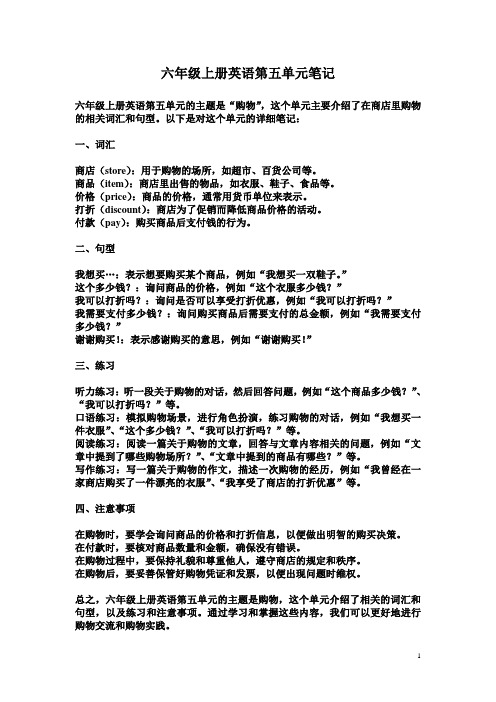
六年级上册英语第五单元笔记六年级上册英语第五单元的主题是“购物”,这个单元主要介绍了在商店里购物的相关词汇和句型。
以下是对这个单元的详细笔记:一、词汇商店(store):用于购物的场所,如超市、百货公司等。
商品(item):商店里出售的物品,如衣服、鞋子、食品等。
价格(price):商品的价格,通常用货币单位来表示。
打折(discount):商店为了促销而降低商品价格的活动。
付款(pay):购买商品后支付钱的行为。
二、句型我想买…:表示想要购买某个商品,例如“我想买一双鞋子。
”这个多少钱?:询问商品的价格,例如“这个衣服多少钱?”我可以打折吗?:询问是否可以享受打折优惠,例如“我可以打折吗?”我需要支付多少钱?:询问购买商品后需要支付的总金额,例如“我需要支付多少钱?”谢谢购买!:表示感谢购买的意思,例如“谢谢购买!”三、练习听力练习:听一段关于购物的对话,然后回答问题,例如“这个商品多少钱?”、“我可以打折吗?”等。
口语练习:模拟购物场景,进行角色扮演,练习购物的对话,例如“我想买一件衣服”、“这个多少钱?”、“我可以打折吗?”等。
阅读练习:阅读一篇关于购物的文章,回答与文章内容相关的问题,例如“文章中提到了哪些购物场所?”、“文章中提到的商品有哪些?”等。
写作练习:写一篇关于购物的作文,描述一次购物的经历,例如“我曾经在一家商店购买了一件漂亮的衣服”、“我享受了商店的打折优惠”等。
四、注意事项在购物时,要学会询问商品的价格和打折信息,以便做出明智的购买决策。
在付款时,要核对商品数量和金额,确保没有错误。
在购物过程中,要保持礼貌和尊重他人,遵守商店的规定和秩序。
在购物后,要妥善保管好购物凭证和发票,以便出现问题时维权。
总之,六年级上册英语第五单元的主题是购物,这个单元介绍了相关的词汇和句型,以及练习和注意事项。
通过学习和掌握这些内容,我们可以更好地进行购物交流和购物实践。
1。
PEP六年级上册英语第5单元知识点

Unit 5 What does he do?一、主要单词:factory 工厂worker工人postman邮递员businessman 商人police officer 警察fisherman渔民scientist 科学家pilot 飞行员coach 教练singer歌手dancer 舞蹈家writer 作家head teacher 校长secretary 秘书reporter记者country 国家sea 大海stay保持university 大学if 如果use使用type打字quickly迅速地gym体育馆or 或者title名称,标题other其他的二、习惯搭配:by car/bus/bike/plane/boat 乘小汽车/公共汽车/自行车/飞机/船go to work去上班study hard 努力学习work hard努力工作hard-working 工作努力的; 辛勤的; stay healthy保持健康go home 回家lots of 许多a lot of 许多go to the camp去度假营be good at...擅长···三、重点句型:1、询问他人的职业的句型及其答语;问句:What does+主语(第三人称单数)+do? ···是做什么的?答语:He/She is a /an+职业名称. 他/她是一位···。
Eg. --What does he do ?=What is he ? 他是做什么的?. --He is a doctor. 他是一个医生。
①、_________________________你的叔叔做什么的?_________________________他是一名警察。
②、_________________________你是做什么的?_________________________我是一名运动员。
牛津上海版英语六年级上册Unit5知识点及语法点

U5一、必会词汇1.programme n 活动安排Eg:What is your programme for tomorrow?2. notice board n 布告栏Eg:The latest news is put on the noticeboard.(1)notice作名词,意为"通知,预告,警告",是不可数名词。
如:The hotel is closed until further notice. 宾馆现已停业,开业时间另行通知。
These rules can't be changed without notice. 这些规则不预先通知不(2)notice作动词,意为"注意到,留心,看到"。
常用于notice sb. do sth.;notice sb. doing sth结构中。
Didn't you notice? He has dyed his hair. 你没注意?他染了头发。
He was too proud to notice me. 他太傲慢了,理都不理我。
Did you notice his hand shaking? 你有没有注意到他的手在抖?Did you notice Jack come in? 你注意到杰克进来了吗?3.entrance n 入口处【知识拓展】enter v进入entrance examnation 入学考试enter for 报名参加Alice is waiting for you at the entrance4. choir n 合唱团【知识拓展】choirboy 唱诗班班的男童歌手choir school 唱诗班学校5. parent n 父亲或母亲【知识拓展】parentage 家世出声A person of unknown parentage 家世不明的人Parent company 总公司6.arrive v 到达Eg:Good weather has arrived at last.【同义】arrive at \in get to reach7. project n 习作项目Eg: look at our class projectHer projects are showing on in the museum8.first then finally【知识拓展】finally adv final adjat first 首先first of all 第一,首先9. invitation n 请帖【知识拓展】v inviteEg.He was invited to Mary’s party yesterday.Jim sent me an invitation to his party.10.classroom n 教室【知识拓展】There are eight students in the classroom.Don’t play football in the classroom.【记忆链接】class-feeling 阶级意识Classmate 同班同学11. craft n 工艺【知识拓展】craftman 匠人aircraft 飞船crafty adj 诡计多端的用作名词(n.)工艺;手艺;狡诈;船舶;航空器;行会成员1.He graduated from a school of crafts and arts.他毕业于一所工艺美术学校。
人教版六年级的英语上册的unit5学习的知识点的归纳.doc
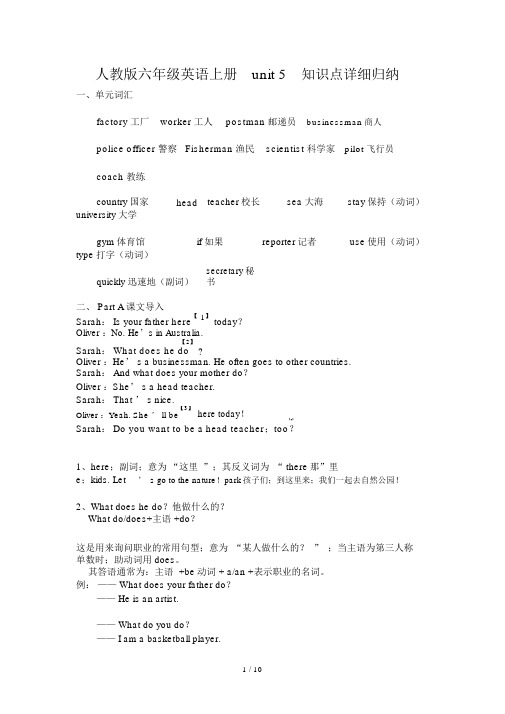
人教版六年级英语上册unit 5知识点详细归纳一、单元词汇factory 工厂 worker 工人postman 邮递员 businessman 商人police officer 警察 Fisherman 渔民 scientist 科学家 pilot 飞行员coach 教练country 国家 head teacher 校长sea 大海stay 保持(动词)university 大学gym 体育馆 if 如果reporter 记者use 使用(动词)type 打字(动词)quickly 迅速地(副词) secretary 秘书二、 Part A 课文导入Sarah : Is your father here 【 1】today ? Oliver :No. He ’s in Australia.【2】 ?Sarah : What does he doOliver :He ’ s a businessman. He often goes to other countries. Sarah : And what does your mother do ? Oliver :She ’ s a head teacher.Sarah : That ’ s nice.【3】here today ! Oliver :Yeah. She ’ ll be【4】Sarah : Do you want to be a head teacher ;too ?1、here ;副词;意为 “这里 ”;其反义词为 “ there 那”里e ;kids. Let ’ s go to the nature !park 孩子们;到这里来;我们一起去自然公园! 2、What does he do ?他做什么的? What do/does+主语 +do ?这是用来询问职业的常用句型;意为 “某人做什么的? ” ;当主语为第三人称单数时;助动词用 does 。
六年级英语上册Unit5知识重点归纳

6A Unit 5 知识重点A:四会:一.单词:k-milked挤牛奶2.taste-tasted品尝3.pull up –pulled up 拨出4.pick-picked摘5.water-watered浇水6.cook-cooked烹饪7.like-liked喜欢st最后的,最近刚过去的9.a farm农场10.else还11.holiday假期12.early早的13. meet相遇,见到14.before在……以前15.did(do的过去式) 16.went (go 的过去式)17.had(have的过去式) 18.collect –collected收集二.词组:过去式词组:1. milk (milked) a cow/cows 给奶牛挤奶2.pull(pulled) up carrots拨出胡萝卜3.water (watered) trees and flowers给树和花浇水4.cook (cooked) rice/food 烧饭/做食物5.watch (watched) a film/films看电影6.taste (tasted) them品尝它们7.pick (picked) a lot of oranges摘许多桔子8collect(collected)eggs 收集鸡蛋st week上周9..a funny cartoon一部滑稽的动画片10.visit (visited) a farm参观一个农场11. on the farm在农场12.go to the farm去农场13.after the holiday 假日后14.meet Nancy见到南希15.before class 课前16. go to school early很早去上学17.talk to 和…说18.talk about 谈论关于…19.talk to my father about the holiday 和我的爸爸谈论假日20.the first day of school after the holiday假期后上学的第一天21.with my parents和我的父母22.with my family和我的家人句子:1.A:What did you do on…/last…/this …/in …?B:I/We …(过去式)A:What else did you do?B:I/We …(过去式)例:What did you do on Wednesday? I watched a film.What else did you do ? I listened to music.B:三会:一.单词:1.fun有趣的事,娱乐2.a carrot 胡萝卜3.a camp 野营,营地4.mountain 山,山脉5.wonderful 精彩的太好了6.cow 母牛,奶牛7.National Day 国庆节8.volleyball排球二.词组:1.the National Day holiday国庆假期 3.at a camp在野营 4.go camping 去野营5.at a camping site在一个野营地点6.his camping trip他的野营旅行7.walk in the mountains 在山里走10.the National Day holiday 11.in the school playground句子:1.Did you like the film? 2.It was a funny cartoon.3.We all liked it very much.4.That was fun!1。
PEP人教版小学六年级英语上册Unit5 重点知识整理

PEP人教版小学六年级英语上册Unit5 重点知识整理
四会单词
工厂factory 工人worker 邮递员Postman 商人businessman 经常police officer 渔民fisherman
科学家scientist 飞行员pilot 教练coach
重点词组
校长head teacher 在海边工作work near the sea 去工作go to work 在澳大利亚in Australia
其他国家other countries 出租车司机taxi driver
足球运动员football player 工厂工人factory worker
许多鱼lots of fish 在船上on a boat
努力学习study hard 保持健康stay healthy
拥有健康的生活have a healthy life
重点句型
1.What does he do ? 他是做什么的?
2. He’s a businessman. 他是一名商人。
3. Where does he work?他在哪里工作?
4. He works at a sea. 他在海上工作。
5. How does he go to work? 他怎么样去上班?
6. He goes to work by bike. 他骑自行车去上班。
7. What does your mother do? 你妈妈是做什么的?
8. She’s a head teacher 她是一名校长。
9. Do you want to be a head teacher? 你想成为一名校长吗?。
人教版新起点英语六年级上册unit 5 what does he do知识点归纳与整理

U51.What do(does) sb do?= What’s sb’s job?=What is *** ? ***是做什么工作的?(询问职业)回答:主语+be+职业。
2.b e going to be…将要成为…3.go to work 去上班4.by plane 乘飞机5.by car 乘小汽车6.go to other countries 去其他的国家7.other、others 、the other、another区别●other.:代词,“另一个“的意思;形容词,后接名词。
●others.:是other的名词复数形式,“另外几个”的意思,后不接名词。
●the other:两者中的另一个●another:三者或三者以上中的另一个8.want to be 想成为9.taxi driver 出租车司机10.football player 足球运动员11.police officer 警察12.factory worker 工厂工人13.at sea在海上in the sea 在海里14.lots of= a lot of 后面既可以接可数名词,也可以接,不可数名词15.every day “每天”做状语放在句尾everyday “每天的”做定语,放在名词前16.on a boat在船上17.see sb. do sth. 看见某人做某事See sb. doing sth. 看见某人正在做某事。
18. a healthy life一种健康的生活方式19.stay healthy= keep healthy 保持健康20.study hard 努力学习21.hard、hardly1、用作形容词,意思:“硬的,困难的,艰难的”The ice is very hard.2、用作副词,意思:“努力地,刻苦地”work hard、study hard3、hardly副词,意思:几乎不22.should、can、will 情态动词后接动词原形23.too相关短语●much too 意思“太”,后接形容词eg.This coat is much too big for me.●too much+ 不可数名词意思:太多too much water●too many+ 可数名词复意思:太多too manyapples24.take sb to sp 带某人去某地25.school gym学校体育馆26.rescue plane 救援机27.list 清单;列出pare 比较(with…)29.different后接名词复数eg different schoolssame后接名词单数前有定冠词the eg in the same school30.be good at+名词、代词、动名词=do well in+名词、代词、动名词意思:擅长于31.be good for 对…有益Running is good for your health.be good to 对…友好She is good to us.32.go running跑步33.in a gym在体育馆34. a sports reporter 一名运动记者e sth. to to sth. 使用某物做某事a useful book一本有用的书36.type quickly 打字非常快37.Real World Camp 实地野营38.try to do something 努力做某事try doing something 尝试做某事try one's best to do something 尽某人最大努力做某事39.allow sb. to do sth. 允许某人做某事allow doing sth.允许做某事40.What+a/an+形容词+可数名词单数+主语+谓语!Eg.What a clever girl she is!What+形容词+不可数/可数名词复数+主语+谓语!Eg.What bad weather it is! 41.Job :工作,可数名词Work :工作,不可数名词a piece of work 一份工作42.what about = how about 后接名词、代词、动名词意思:…怎么样,用于提建议43.maybe,“也许、大概”,位于句首Maybe she will come this afternoon.may be , “也许是、可能是”,位于句中It may be in your schoolbag44.play games玩游戏puter games 电脑游戏46.unusual 不同寻常的47.lion tamer狮子驯养师48.bee farmer 养蜂人49.get stung 被蛰到puter game tester电脑游戏测试员51.magicians 魔术师52.assistant 助手53.nut cracker 夹碎坚果的钳子测验小卷U51.询问职业的三种表达方式及回答:2.将要成为…3.去上班4.乘飞机5.乘小汽车6.去其他的国家7.想成为8.出租车司机9.足球运动员10.警察11.工厂工人12.other、others 、the other、another区别other:others:the other:another:13.在海上:在海里:14.lots of= ________________ 后面既可以接___________,也可以接________________15.every day 意思: ______________,做状语放在______________everyday意思: ______________,放在_____________16.在船上:17.看见某人做某事看见某人正在做某事。
六年级英语上册知识梳理-Unit 5 The broken computer I-北师大版
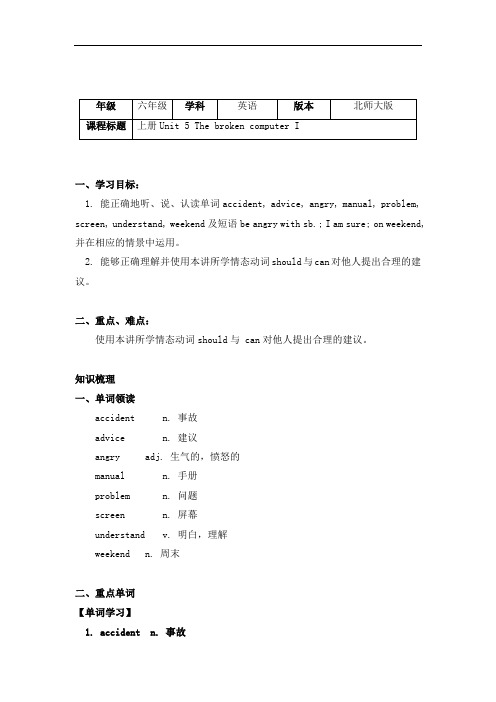
一、学习目标:1. 能正确地听、说、认读单词accident, advice, angry, manual, problem, screen, understand, weekend及短语be angry with sb.; I am sure; on weekend, 并在相应的情景中运用。
2. 能够正确理解并使用本讲所学情态动词should与can对他人提出合理的建议。
二、重点、难点:使用本讲所学情态动词should与 can对他人提出合理的建议。
知识梳理一、单词领读accident n. 事故advice n. 建议angry adj. 生气的,愤怒的manual n. 手册problem n. 问题screen n. 屏幕understand v. 明白,理解weekend n. 周末二、重点单词【单词学习】1. accident n. 事故【音标】【用法】为可数名词,有单复数形式,当为单数时,其前若加冠词应为an accident.【考题链接】选择合适的词填空He died in an automobile _________years ago.他数年前死于车祸。
A. accidentB. an accidentC. accidents答案:A解题思路:因为前面已有冠词an,所以不必再加冠词或s,故选A。
2. advice n. 建议【音标】【用法】一般为不可数名词,若想表达“一条建议”则为a piece of advice, 也可用some,much,pieces of等修饰,不能说an advice或many/a few advices。
【例句】I want your advice, sir. I don't know what to do.先生,我需要您的指点。
我不知该怎么办才好。
【考题链接】选择合适的词填空Let me give you_________. 我给你一句忠告吧。
